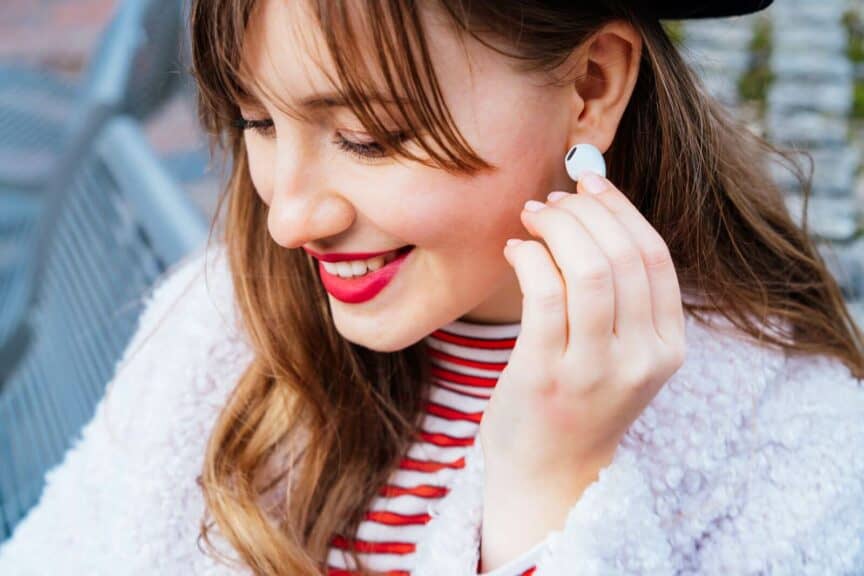A popular misconception about hearing loss is that it only impacts older adults. While aging is one cause of hearing loss, there are other causes that impact people across the age spectrum. In fact, 10% of Millennials and 17% of Gen Z already have some degree of hearing loss in the U.S.. But because hearing loss is often thought about as primarily impacting older adults, the millennial and Gen Z experience of it is not widely recognized. This contributes to a delay in treatment which can worsen hearing loss as well as the health effects of untreated symptoms.
Millennials, Gen Z, & Hearing Loss
According to the World Health Organization (WHO), over 1 billion people globally, ages 12-35 are at high risk of developing hearing loss due to loud noise exposure. This highlights that hearing loss also impacts Millennials and Gen Z. A few common ways that they are exposed to loud noise includes the following:
- Earbuds/Headphones: earbuds or headphones are common ways that people listen to audio. From podcasts, to talking on the phone, and listening to music; earbuds allow people to enjoy audio conveniently. But this is also a common way that people are exposed to loud noise. Depending on the device they are connected to, earbuds or headphones can deliver hazardous volumes of sound. According to experts, sound that exceeds 85 decibels (dB) is considered dangerous for hearing health. Earbuds connected to an iPhone on its highest volume setting can reach up to 100dB. This highlights the risk using earbuds/headphones can pose for hearing health.
- Social Life: another common way that Miellenais and Gen Z are exposed to loud noise is through social settings and activities. Spaces like busy and active restaurants, bars, clubs, concerts etc. produce noise levels that are high. Frequently navigating these settings means repeated exposure to loud noise which can take a toll on hearing health.
- Work: the Hearing Health Foundation estimates that over 22 million people are exposed to hazardous noise levels in the workplace. There are numerous examples of work environments that are noisy. This includes: restaurants, bars, music/entertainment venues, transportation hubs etc. Navigating noisy workplaces can pose a major risk for hearing health, especially because substantial time is spent in work settings.
These modes of loud noise exposure can significantly affect hearing health, contributing to the development of noise induced hearing loss which more and more Millennials and Gen Z are experiencing an increased risk of.
Understanding Noise Induced Hearing Loss
One time or regular exposure to loud noise can irreparably damage the auditory system – the sensory system for hearing. Loud noise can impair the sensory cells that are in the inner ear. There are thousands of these cells in the cochlea and they play a major role in how sound is processed. These cells receive incoming soundwaves and convert them into electrical signals. These signals then get sent to the brain where they are further processed. The brain assigns meaning to these signals, allowing us to understand what we hear.
Loud noise can dentists and weaken these cells, reducing their capacity to effectively process soundwaves. This results in the brain receiving less auditory information, producing hearing loss. Unlike other types of cells we have, sensory cells in the inner ear do not regenerate. There are also no ways to repair them which means that any damage they experience is permanent. This causes chronic, noise induced hearing loss.
Tips to Protect Hearing Health
It is important to know that noise induced hearing loss is totally preventable. There are safety measures you can practice to protect your hearing health. This includes:
- Wearing hearing protection: this includes earplugs, earmuffs, and headphones which provide the ears with a physical barrier. This reduces the amount of loud noise that is absorbed.
- Maintaining low volume settings: apply the 50-60% rule which means using only half or a little more than half of the total volume on your electronic devices. This allows you to listen to audio safely.
- Reducing exposure: there are more ways you can reduce your exposure to loud noise including avoiding noisy settings (especially during peak hours) and opting for quieter places, taking listening breaks throughout the day, and spacing out social events/activities.
- Getting hearing tested regularly: be sure to also get your hearing tested regularly so you can monitor your hearing health.
Contact us today to learn more about how you can protect your hearing health and the resources available to support you!

